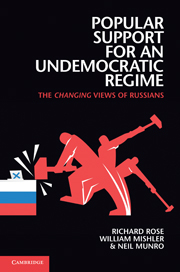Book contents
- Frontmatter
- Contents
- List of figures
- List of tables
- Introduction: The need for popular support
- 1 Democratic and undemocratic models of support
- 2 Changing the supply of regimes
- 3 Putin consolidates a new regime
- 4 Increasing support for an undemocratic regime
- 5 Individual influences on regime support
- 6 Time tells: there is no alternative
- 7 Finessing the challenge of succession
- 8 The challenge of economic reversal
- 9 Maintaining a regime – democratic or otherwise
- Appendix A New Russia Barometer samples
- Appendix B Coding of variables
- References
- Index
8 - The challenge of economic reversal
Published online by Cambridge University Press: 05 June 2012
- Frontmatter
- Contents
- List of figures
- List of tables
- Introduction: The need for popular support
- 1 Democratic and undemocratic models of support
- 2 Changing the supply of regimes
- 3 Putin consolidates a new regime
- 4 Increasing support for an undemocratic regime
- 5 Individual influences on regime support
- 6 Time tells: there is no alternative
- 7 Finessing the challenge of succession
- 8 The challenge of economic reversal
- 9 Maintaining a regime – democratic or otherwise
- Appendix A New Russia Barometer samples
- Appendix B Coding of variables
- References
- Index
Summary
The reversal of world economic conditions is trebly significant for Russia. First, it has been severe because the economic boom that preceded it was heavily dependent on the rise in the world market price of exports such as oil, gas and natural resources (Rutland,2008; Goldman, 2008). Secondly, the consolidation of support for the new regime has been significantly influenced by the decade-long economic boom following the 1998 ruble crisis (see Figure 6.2). Thirdly, dissatisfied Russians cannot alter the government at the ballot box. An economic crisis originating in the epicenter of capitalism, Wall Street, could encourage Russians to view the Kremlin as offering protection against the turbulence of world capitalism.
In medicine, the term crisis connotes a turning point at which a patient is most vulnerable to suffering the worst effects of a threatening clinical condition, for example, a serious heart attack. If the point is passed successfully, then recuperation follows. The unexpected abruptness of the 2008 economic crisis was analogous to a severe heart attack. At this point the correspondence stops, for while a patient can die rather than recover, an economy goes on and on. While its dynamic character implies that there can be a recovery after a reversal, this may come after economic contraction has damaged political support.
- Type
- Chapter
- Information
- Popular Support for an Undemocratic RegimeThe Changing Views of Russians, pp. 142 - 155Publisher: Cambridge University PressPrint publication year: 2011

